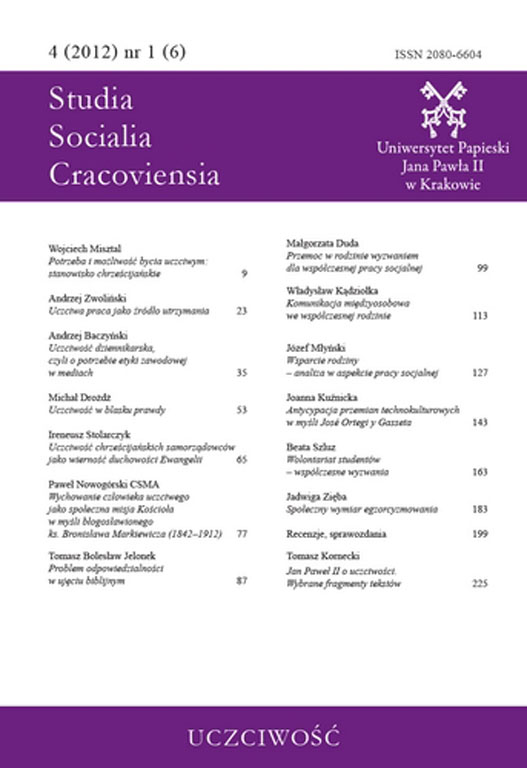Problem odpowiedzialności w ujęciu biblijnym
DOI:
https://doi.org/10.15633/ssc.392Słowa kluczowe:
odpowiedzialność, odpowiedzialność zbiorowa, odpowiedzialność indywidualna, wolność, odpłata, trzy dary, ziemia, królestwo, świątynia, życie pozagrobowe, Ezechiel, Hiob, KoheletAbstrakt
Opis stworzenia człowieka i następujący po nim opis upadku pokazują, że człowiek jest istotą etyczną i podlega prawom moralnym. To rodzi odpowiedzialność. Przestępstwo podlega karze, a posłuszeństwo zostanie nagrodzone. W dziejach objawienia biblijnego najpierw dochodzi do głosu pojęcie odpowiedzialności zbiorowej, które traci swoją rolę tłumaczenia wydarzeń przeżywanych przez naród w obliczu niewoli babilońskiej. Wtedy dochodzi do głosu pojęcie odpowiedzialności osobistej, które pozwala każdej jednostce uczestniczyć w podtrzymywaniu religijnego stosunku do Boga, ale rodzi także poważne trudności. Księga Joba podejmuje problem cierpienia sprawiedliwych, Księga Koheleta zagadnienie, dlaczego niesprawiedliwy nie ponosi kary. Pełniejsze rozwiązanie możliwe jest dopiero po zrozumieniu, że odpłata nie kończy się w ramach życia ziemskiego, ale jest na nią miejsce w życiu pozagrobowym. To staje się wezwaniem do podjęcia odpowiedzialności związanej z nadzieją pełną nieśmiertelności.Pobrania
Opublikowane
2012-09-09
Numer
Dział
Rozprawy, opracowania
Licencja
Prawa autorskie (c) 2012 Tomasz Bolesław Jelonek

Praca jest udostępniana na licencji Creative Commons Attribution-NonCommercial-NoDerivatives 3.0 Unported License.
Autorzy publikujący w czasopiśmie udzielają jego wydawcy zgody o następującej treści:
- Autor zachowuje autorskie prawa majątkowe do utworu, a jednocześnie udziela wydawcy czasopisma zgody na jego pierwszą publikację w wersji drukowanej i wersji online na licencji Creative Commons Uznanie autorstwa 4.0 Międzynarodowe oraz zgody na wykonywanie opracowań, w tym przekładów.
- Autor ma możliwość udzielania zgody niewyłącznej na opublikowanie utworu w wersji, która ukazała się w czasopiśmie (np. zamieszczenia go w repozytorium instytucjonalnym lub opublikowania w książce), wraz z informacją o jego pierwszej publikacji w czasopiśmie.
- Autor może umieścić swój utwór online (np. w repozytorium instytucjonalnym lub na swojej stronie internetowej) jeszcze przed zgłoszeniem utworu do czasopisma.

